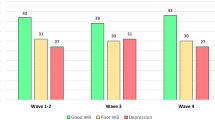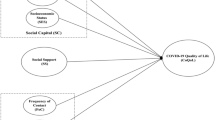Abstract
Aims
The current study aimed to investigate correlates of psychological well-being during the lockdown in Shanghai, especially the association between social resources and well-being.
Subject and method
An online survey was conducted, recruiting 3230 participants over 18 years old from 16 districts in Shanghai. The 5-item World Health Organization Well-Being Index (WHO-5) was used to measure well-being, and a linear multivariable regression analysis was used to explore psychosocial correlates of well-being.
Results
The results indicate the mean WHO-5 score was 12.24 ± 7.13, and 55.3% of participants reported poor well-being (defined by WHO-5 score ≤ 13). Social capital was associated with higher well-being, and factors associated with lower well-being included older age, higher education level, being students, loss in income, and quarantine experience.
Conclusions
In conclusion, the well-being of the public constitutes a major issue during the lockdown in Shanghai, calling for more attention to the adverse psychological effect of future pandemic-control measures.
Similar content being viewed by others
Data availability
The data that support the findings of this study are available from the corresponding author upon reasonable request.
Code availability
Not applicable.
References
Barrafrem K, Tinghög G, Västfjäll D (2021) Trust in the government increases financial well-being and general well-being during COVID-19. J Behav Exp Financ 31(10):0514. https://doi.org/10.1016/jjbef2021100514
Ben-Zur H (2009) Coping Styles and Affect. Int J Stress Manag 16(2):87–101. https://doi.org/10.1037/a0015731
Bruns DP, Kraguljac NV, Bruns TR (2020) COVID-19: facts cultural considerations and risk of stigmatization. J Transcult Nurs 31(4):326–332. https://doi.org/10.1177/1043659620917724
Chan SM, Chung GKK, Chan YH, Woo J, Yeoh EK, Chung RYN, Wong SYS, Marmot M, Lee RWT, Wong H (2021) The mediating role of individual-level social capital among worries mental health and subjective well-being among adults in Hong Kong during the COVID-19 pandemic. Curr Psychol 0123456789. https://doi.org/10.1007/s12144-021-02316-z
Chen XG, Yu B (2022) Social Capital Behavior and Health (In preparation). Springer Nature
Cole SR, Stuart EA (2010) Generalizing evidence from randomized clinical trials to target populations: The ACTG 320 trial. Am J Epidemiol 172(1):107–115. https://doi.org/10.1093/aje/kwq084
de Sio S, Torre G, La Buomprisco G, Lapteva E, Perri R, Corbosiero P, Ferraro P, Giovannetti A, Greco E, Cedrone F (2021) Consequences of COVID19-pandemic lockdown on Italian occupational physicians’ psychosocial health. PLoS ONE 16(2):1–12. https://doi.org/10.1371/journalpone0243194
Deng J, Zhou F, Hou W, Silver Z, Wong CY, Chang O, Drakos A, Zuo QK, Huang E (2021) The prevalence of depressive symptoms anxiety symptoms and sleep disturbance in higher education students during the COVID-19 pandemic: a systematic review and meta-analysis. Psychiatry Res 301:113863. https://doi.org/10.1016/jpsychres2021113863
Fung SF, Kong CYW, Liu YM, Huang Q, Xiong Z, Jiang Z, Zhu F, Chen Z, Sun K, Zhao H, Yu P (2022) Validity and psychometric evaluation of the Chinese version of the 5-Item WHO Well-Being Index. Front Public Heal 10:872436. https://doi.org/10.3389/fpubh.2022.872436
Gadermann A, Thomson K, Gill R, Schonert-Reichl KA, Gagné Petteni M, Guhn M, Warren MT, Oberle E (2022) Early adolescents’ experiences during the COVID-19 pandemic and changes in their well-being. Front Public Heal 10:1–14. https://doi.org/10.3389/fpubh2022823303
Gao J, Zheng P, Jia Y, Chen H, Mao Y, Chen S, Wang Y, Fu H, Dai J (2020) Mental health problems and social media exposure during COVID-19 outbreak. PLoS ONE 15(4):1–10. https://doi.org/10.1371/journalpone0231924
Gray NS, O’Connor C, Knowles J, Pink J, Simkiss NJ, Williams SD, Snowden RJ (2020) The influence of the COVID-19 pandemic on mental well-being and psychological distress: impact upon a single country. Front Psychiatry 11:1–11. https://doi.org/10.3389/fpsyt2020594115
Green H, Fernandez R, MacPhail C (2022) Well-being and social determinants of health among Australian adults: a national cross-sectional study. Heal Soc Care Community 30(6):e4345–e4354. https://doi.org/10.1111/hsc13827
Hall BJ, Li G, Rafiq MY, Lu J, Li C (2022) Digital determinants of public mental health and well-being in Shanghai during the 2022 lockdown. Asian Asian J Psychiatr 76:103155. https://doi.org/10.1016/jajp2022103155
Hall BJ, Li G, Chen W, Shelley D, Tang W (2023) Prevalence of depression anxiety and suicidal ideation during the Shanghai 2022 lockdown: a cross-sectional study. J Affect Disord 330:283–290. https://doi.org/10.1016/jjad202302121
Hoang TD, Colebunders R, Fodjo JNS, Nguyen NPT, Tran TD, Van Vo T (2021) Well-being of healthcare workers and the general public during the covid-19 pandemic in vietnam: an online survey. Int J Environ Res Public Health 18(9):1–10. https://doi.org/10.3390/ijerph18094737
Hoi CK, Chen W, Zhou F, Sou K, Hall BJ (2015) The association between social resources and depressive symptoms among Chinese migrants and non-migrants living in Guangzhou China. J Pacific Rim Psychol 9:120–129. https://doi.org/10.1017/prp201512
Ibarra-Rovillard MS, Kuiper NA (2011) Social support and social negativity findings in depression: Perceived responsiveness to basic psychological needs. Clin Psychol Rev 31(3):342–352. https://doi.org/10.1016/jcpr201101005
Khan AA, Lodhi FS, Rabbani U, Ahmed Z, Abrar S, Arshad S, Irum S, Khan MI (2021) Impact of coronavirus disease (COVID-19) pandemic on psychological well-being of the Pakistani general population. Front Psychiatry 11:1–10. https://doi.org/10.3389/fpsyt2020564364
Knepple Carney A, Graf AS, Hudson G, Wilson E (2021) Age moderates perceived COVID-19 disruption on well-being. Gerontologist 61(1):30–35. https://doi.org/10.1093/geront/gnaa106
Knox L, Karantzas GC, Romano D, Feeney JA, Simpson JA (2022) One year on: What we have learned about the psychological effects of COVID-19 social restrictions: a meta-analysis. Curr Opin Psychol 46:101315. https://doi.org/10.1016/jcopsyc2022101315
Laczkó T, Ács P, Morvay-Sey K, Cselik B, Stocker M (2023) The role of sports in the subjective psychological well-being of Hungarian adult population in three waves of the COVID-19 pandemic. Int J Environ Res Public Health 20(1). https://doi.org/10.3390/ijerph20010660
McLaren L, Hawe P (2005) Ecological perspectives in health research. J Epidemiol Commun Health 59(1):6–14. https://doi.org/10.1136/jech2003018044
Miao C, Xue D, Tour L, Yang H, Hall BJ (2020) Media use and acute psychological outcomes during the novel coronavirus pneumonia (COVID-19) outbreak in China. J Anxiety Disord 74:102248. https://doi.org/10.1016/jjanxdis2020102248
Ng W, Kang SH (2022) Predictors of well-being during the COVID-19 pandemic: the importance of financial satisfaction and neuroticism. J Community Psychol 50(7):2771–2789. https://doi.org/10.1002/jcop22795
O’Connor RC, Wetherall K, Cleare S, McClelland H, Melson AJ, Niedzwiedz CL, O’Carroll RE, O’Connor DB, Platt S, Scowcroft E, Watson B, Zortea T, Ferguson E, Robb KA (2021) Mental health and well-being during the COVID-19 pandemic: longitudinal analyses of adults in the UK COVID-19 Mental Health Well-being study. Br J Psychiatry 218(6):326–333. https://doi.org/10.1192/bjp2020212
Ögel-Balaban H (2022) The use of online social network sites during the COVID-19 pandemic as a protective or risk factor for the well-being of university students. Cyberpsychology 16(3). https://doi.org/10.5817/CP2022-3-4
Psychiatric Research Unit (n.d.) WHO-Five Well-being Index (WHO-5). Retrieved May 23 2023 from http://www.who-5.org
Qiu J, Shen B, Zhao M, Wang Z, Xie B, Xu Y (2020) A nationwide survey of psychological distress among Chinese people in the COVID-19 epidemic: implications and policy recommendations. Gen Psychiatry 33(2):1–4. https://doi.org/10.1136/gpsych-2020-100213
Schneider J, Talamonti D, Gibson B, Forshaw M (2022) Factors mediating the psychological well-being of healthcare workers responding to global pandemics: a systematic review. J Health Psychol 27(8):1875–1896. https://doi.org/10.1177/13591053211012759
Seckman C (2022) The impact of COVID-19 on the psychosocial well-being of older adults: a literature review. J Nurs Scholarsh 55(1):97–111. https://doi.org/10.1111/jnu12824
Shi L, Lu ZA, Que JY, Huang XL, Liu L, Ran MS, Gong YM, Yuan K, Yan W, Sun YK, Shi J, Bao YP, Lu L (2020) Prevalence of and risk factors associated with mental health symptoms among the general population in China during the coronavirus disease 2019 pandemic. JAMA Netw Open 3(7):e2014053. https://doi.org/10.1001/jamanetworkopen202014053
Shi H, Zhu H, Ni Y (2022) COVID-19 in China: a rapid review of the impacts on the mental health of undergraduate students. Front Public Heal 10:1–10. https://doi.org/10.3389/fpubh2022940285
Stokols D (1996) Translating social ecological theory. Into Am J Heal Promot 10(4):282–298. https://doi.org/10.4278/0890-1171-104282
Swindale A, Bilinsky P (2006) Development of a universally applicable household food insecurity measurement tool: process current status and outstanding issues. J Nutr 136(5):1449–1452. https://doi.org/10.1093/jn/13651449s
Topp CW, Østergaard SD, Søndergaard S, Bech P (2015) The WHO-5 well-being index: a systematic review of the literature. Psychother Psychosom 84(3):167–176. https://doi.org/10.1159/000376585
Vindegaard N, Benros ME (2020) COVID-19 pandemic and mental health consequences: Systematic review of the current evidence. Brain Behav Immun 89:531–542. https://doi.org/10.1016/jbbi202005048
Wang C, Riyu P, Xiaoyang W, Yilin T, Linkang X, Cyrus SH, Roger C Ho (2020) Immediate psychological responses and associated factors during the initial stage of the 2019 coronavirus disease (COVID-19) epidemic among the general population in China. Int J Environ Res Public Health 17(5):1–25. https://www.ncbinlmnih.gov/pmc/articles/PMC7084952/
White RG, Van Der Boor C (2020) Impact of the COVID-19 pandemic and initial period of lockdown on the mental health and well-being of adults in the UK. Bjpsych Open 6(5):1–4. https://doi.org/10.1192/bjo202079
Whitehead BR, Torossian E (2021) Older adults’ experience of the COVID-19 pandemic: a mixed-methods analysis of stresses and joys. Gerontologist 61(1):36–47. https://doi.org/10.1093/geront/gnaa126
Wu TL, Hall BJ, Canham S, Lam AIF (2016) The association between social capital and depression among Chinese older adults living in public housing. J Nerv Ment Dis 204:764–769. https://doi.org/10.1097/NMD0000000000000561
Zacher H, Rudolph CW, Posch M (2021) Individual differences and changes in self-reported work performance during the early stages of the COVID-19 pandemic. Am Psychol 65(4):188–201. https://doi.org/10.1026/0932-4089/a000365
Zangger C (2023) Localized social capital in action: how neighborhood relations buffered the negative impact of COVID-19 on subjective well-being and trust. SSM - Popul Heal 21:101307. https://doi.org/10.1016/jssmph2022101307
Zhao F, Cui Z, Zhao X, Liu W (2023) Did COVID-19 affect rural households’ subjective well-being? A social survey from rural China. Int J Disaster Risk Reduct 92:103736. https://doi.org/10.1016/jijdrr2023103736
Acknowledgements
We are grateful to Dr. Haidong Lu for developing the study weighting.
Funding
No funding was received for conducting this study.
Author information
Authors and Affiliations
Contributions
Conceptualization: Brian J. Hall; Methodology: Brian J. Hall; Formal analysis: Chenxi Liao; Data Curation: Gen Li; Writing—original draft preparation: Chenxi Liao; Writing—review and editing: Gen Li, Chunbo Li, Brian J. Hall; Supervision: Brian J. Hall.
Corresponding authors
Ethics declarations
Ethics approval
The study protocol was approved by the NYU Shanghai Institutional Review Board.
Consent to participate
Informed consent was obtained from all individual participants included in the study.
Consent for publication
Not applicable.
Conflicts of interest
The authors have no competing interests to declare that are relevant to the content of this article.
Additional information
Publisher’s Note
Springer Nature remains neutral with regard to jurisdictional claims in published maps and institutional affiliations.
Rights and permissions
Springer Nature or its licensor (e.g. a society or other partner) holds exclusive rights to this article under a publishing agreement with the author(s) or other rightsholder(s); author self-archiving of the accepted manuscript version of this article is solely governed by the terms of such publishing agreement and applicable law.
About this article
Cite this article
Liao, C., Li, G., Li, C. et al. Correlates of well-being among Chinese adults during the 2022 lockdown in Shanghai. J Public Health (Berl.) (2024). https://doi.org/10.1007/s10389-023-02184-w
Received:
Accepted:
Published:
DOI: https://doi.org/10.1007/s10389-023-02184-w




